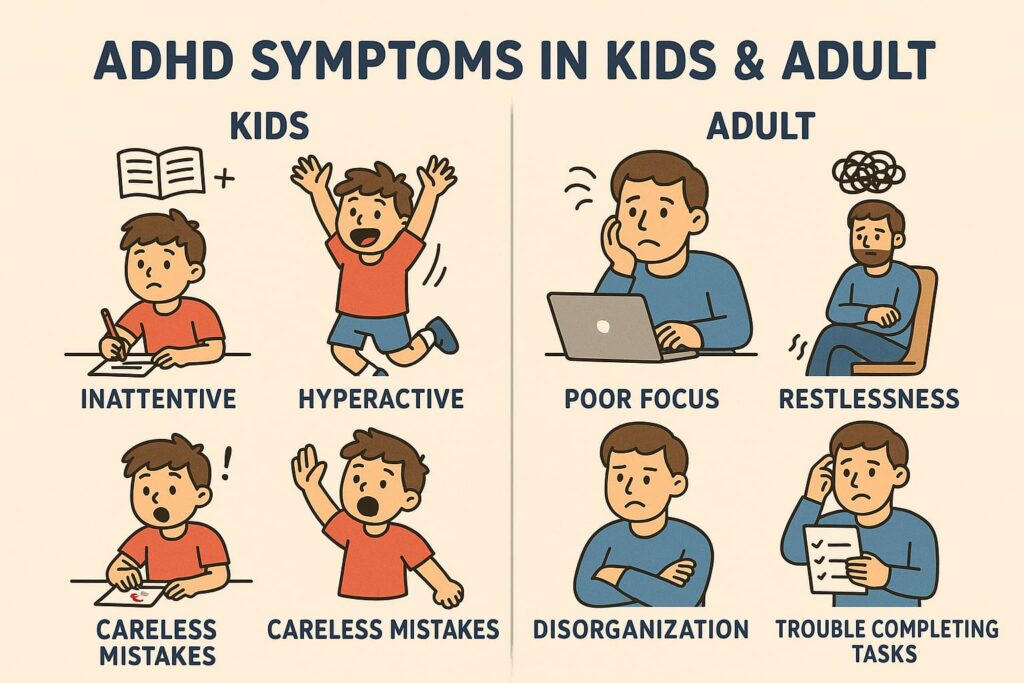ADHD assessments online offer a convenient way for individuals to begin understanding whether they may have ADHD. These assessments typically consist of self-report questionnaires based on established clinical criteria, allowing for quick and confidential screening from home. They provide an initial indication of symptoms and can help determine if a formal evaluation with a healthcare professional is needed.
Many online platforms also offer follow-up services, including full assessments, diagnoses, and treatment options that can be accessed remotely. This approach reduces wait times and increases accessibility, especially for those living in areas with limited healthcare resources. The use of evidence-based tools ensures that the results remain reliable and relevant for both adults and children.
By taking an online ADHD assessment, individuals gain clarity on their symptoms and next steps without immediate in-person appointments. This makes it easier to seek appropriate support and treatment tailored to their specific needs.
Understanding ADHD Assessment Online
Online ADHD assessments offer a straightforward and accessible way to begin understanding attention challenges. These evaluations use standardized tools and technology to screen symptoms, provide insights, and sometimes guide toward professional diagnosis and treatment options.
What Is an Online ADHD Assessment
An online ADHD assessment is a digital questionnaire or screening tool designed to identify symptoms of Attention Deficit Hyperactivity Disorder. It typically targets issues such as inattention, impulsivity, and hyperactivity in both children and adults.
These assessments are often based on established clinical criteria and rating scales, like the WHO Adult ADHD Self-Report Scale (ASRS). While some tests only provide preliminary insights, others connect users with healthcare professionals for formal diagnosis and treatment planning.
How Digital Evaluations Work
Digital ADHD evaluations involve completing structured questionnaires on secure platforms. Users answer questions about their concentration, behavior, and executive functioning.
The responses are scored automatically, often providing instant feedback or a detailed report outlining symptom severity. Some services pair these results with telehealth consultations, allowing further medical evaluation and personalized treatment without in-person visits.
Confidentiality and data security are typically prioritized, ensuring user information is protected throughout the process.
Key Features of Effective Online Assessments
Effective online ADHD assessments share several characteristics:
- Evidence-Based: They utilize validated tools recognized by medical authorities.
- Comprehensive: Cover various ADHD symptoms including inattention, hyperactivity, and impulsivity.
- User-Friendly: Designed for easy navigation, often suitable for different age groups.
- Instant Results: Provide quick feedback or detailed reports.
- Professional Support: Offer access to licensed practitioners for diagnosis, treatment, or accommodations.
- Confidential: Guarantee privacy and secure handling of personal health data.
These features improve accuracy and convenience, making assessments a reliable first step in managing ADHD symptoms.
Choosing and Taking an Online ADHD Assessment
Selecting the right online ADHD assessment involves evaluating the tool’s credibility and suitability. Preparing properly ensures the assessment accurately reflects symptoms. Knowing the follow-up steps after completion helps individuals understand their next actions.
Criteria for Selecting the Right Online Tool
The assessment platform should be run or supervised by licensed professionals. It must use evidence-based tools rather than generic quizzes. Verification of credentials and transparent methodology is essential.
Look for platforms offering comprehensive evaluations for different age groups. Reviews and referrals provide insights into reliability. Tools that offer personalized reports or planning options add value.
Security and confidentiality of personal information are also crucial. Assessments tied to treatment recommendations or access to clinical support can enhance the experience.
Preparing for an Accurate Assessment Experience
The individual must complete the questionnaire in a quiet, distraction-free environment. Honest and thoughtful answers improve the accuracy of results.
Gathering relevant history, including educational, behavioral, and medical background, helps during assessment. Some services allow pre-assessment consultations, which clarify expectations and timing.
It’s important to set aside enough time without breaks to maintain focus. Avoid rushing through questions or relying on memory alone for symptoms.
What to Expect After Completing an Online Evaluation
Results are typically provided within days and may include a preliminary diagnosis or symptom analysis. Many platforms offer follow-up consultations with a nurse practitioner or clinician.
The assessment may lead to treatment plans involving medication, therapy, or accommodations. Individuals might receive recommendations for next steps, including in-person evaluations if needed.
If the platform offers, ongoing virtual support and monitoring can be arranged. Clear instructions on how to interpret and use results are a key part of the process.




